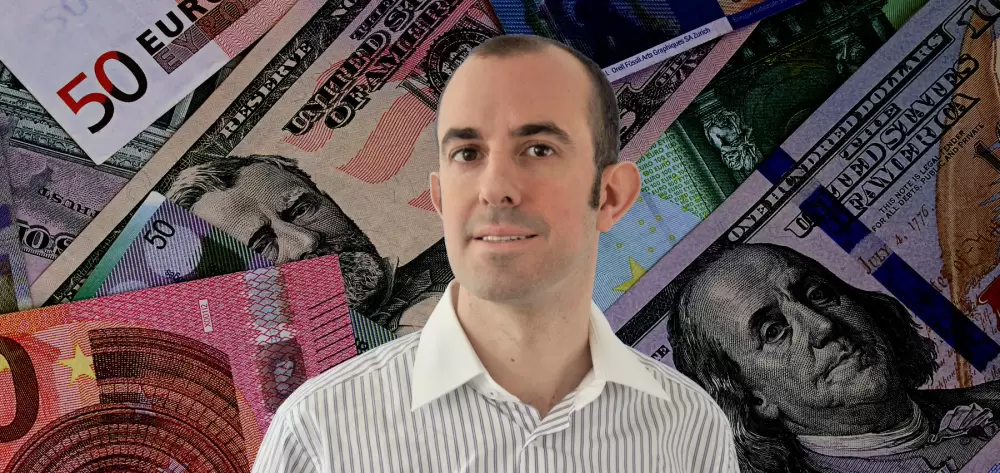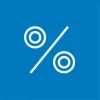Some time ago, an acquaintance of mine inherited a seven-figure amount in Swiss francs. Because they did not live in Switzerland, they had the money paid into their bank account in the country they lived in, and the money was converted into the local currency. Over the next few years, the local currency took a nosedive against the Swiss franc, effectively halving the original Swiss franc value of their inheritance.
Observing that and similar experiences got me interested in calculating how much a person could lose by holding foreign currencies, especially because I often hold some amount of foreign currency myself. To find out, I looked at the gain or loss of major world currencies and exceptionally strong world currencies against the Swiss franc between February 28, 2014 and February 28, 2024. For my calculations, I used mid-market rates provided by XE.com.
Here, I show how much money I would have lost by changing 1000 Swiss francs into a foreign currency, and then changing the money back into francs after 10 years.
Bear in mind that I did not account for the exchange rate markups and commissions charged by banks. The losses would be much bigger if those costs were accounted for. Figures are rounded to the nearest franc.
1. US dollar: 2 francs lost
In 2014, my 1000 francs would have gotten me nearly 1137 US dollars. Fast-forward to the present and those 1137 dollars would get me just short of 998 Swiss francs. My loss on the round trip would be just over 2 Swiss francs. But the dollar has not always done so well: Had I changed Swiss francs into dollars 20 years ago, I would have lost 310 out of every 1000 francs I had changed.
2. Singapore dollar: 61 francs lost
Singapore’s currency is one of the strongest in the world, but even Sing dollars lost value against the Swiss franc. When I was working for a Singapore-based company back in 2014, 1000 francs would get me 1438 Singaporean dollars. If I changed that 1438 dollars back into francs in 2024, I would get just 939 francs back. My loss would be just under 61 Swiss francs per 1000 francs.
3. Chinese yuan: 148 francs lost
The 6977 yuan I would get for 1000 francs back in 2014 would today buy me just 852 Swiss francs. By holding yuan over those ten years, I would lose 148 Swiss francs.
4. Euro: 217 francs lost
In 2014, I had every reason to believe that the euro would go right on hovering at the 1.20 franc rate we had gotten used to before the Swiss National Bank pulled the plug. That did not happen though. The 822 euros I would get for each 1000 francs back in 2014 would now bring me just 783 francs. In other words, holding euros would cost me 217 Swiss francs.
5. British pound: 246 francs lost
At the end of February, 2014, the mid-market rate was 678 quid per 1000 Swiss francs. Today – a short 10 years later – those 678 pounds would get me just 754 francs, resulting in a capital loss of just under 246 Swiss francs.
6. Australian dollar: 275 francs lost
What would that wad of Aussies that my brother’s been saving for his proverbial next Australian backpacking adventure be worth today? If he were to exchange the money back into Swiss francs today, he would get back just 725 francs for every 1000 francs exchanged into Australian dollars when he backpacked down under in 2014. The loss would be 275 Swiss francs.
7. Japanese yen: 324 francs lost
On February 28, 2014, I would have gotten nearly 115,892 yen per 1000 francs I changed. On February 28, 2024, I would have gotten 676 francs for that 115,892 yen. I would have lost 324 Swiss francs by holding the money in yen.
8. Swedish krona: 381 francs lost
In 2014, the year that I first visited Sweden, 1000 francs brought me 7278 Swedish kronor. 10 years later, every 7278 kronor would bring me just 619 francs. Holding 1000 francs worth of kronor from 2014 to 2024 would cost me 381 Swiss francs.
9. Norwegian krone: 435 francs lost
Holding Norwegian kroner would have been an expensive exercise as well. In 2014, I would have received just under 6806 kroner for a 1000-franc note. In 2024, my 6806 kroner would bring me just 565 francs. The cost of buying and holding Norwegian kroner as opposed to tucking that thousand-franc note under my mattress would be 435 Swiss francs.
10. South African rand: 445 francs lost
This point is particularly interesting to me because of the years I spent in South Africa saving, investing, and thinking in rand. Ten years ago, I would get just over 12 rand per Swiss franc, or 12,180 rand per 1000 francs, to be exact. If I changed that 12,180 rand back into francs today, I would get back just 555 francs – a loss of 445 Swiss francs.
11. Brazilian real: 531 francs lost
Back in 2014, two years before Brazil hosted the summer olympics, 1000 francs would get you just under 2647 reals. But times have changed, and today, Swiss vacationing or doing business in Brazil get 5637 reals for 1000 francs. That means the 2647 reals I would have gotten ten years ago would today be worth just short of 469 francs. By holding reals, I would have lost 531 Swiss francs for every 1000 francs exchanged.
Total loss for all currencies combined: 3065 francs
Suppose I had exchanged 1000 francs into each of the 11 currencies listed above, or a total of 11,000 francs. Ten years later, I would get back just 7935 francs. My total, combined loss would be 3065 Swiss francs.
Historical rates are no guarantee
My calculations above show that in the past, holding any major foreign currency would have resulted in a loss compared to holding Swiss francs. But it is important to understand that there are many economic and political factors which can affect a currency’s value. There is no sure way to predict how currency exchange rates will develop in the future.
Real rates are often less favorable
For my calculation, I used mid-market rates. The exchange rates that you actually get when you change Swiss francs into foreign currencies and back are generally much less favorable. In addition to markups added to interbank rates by banks and money changers, you may also be charged currency exchange commissions.
More on this topic:
Investment Returns in 2023: Nasdaq Dwarfs Swiss Stocks
How Much Money Could You Make With Swiss Stocks?
How Much Money Could You Lose With Swiss Stocks?






